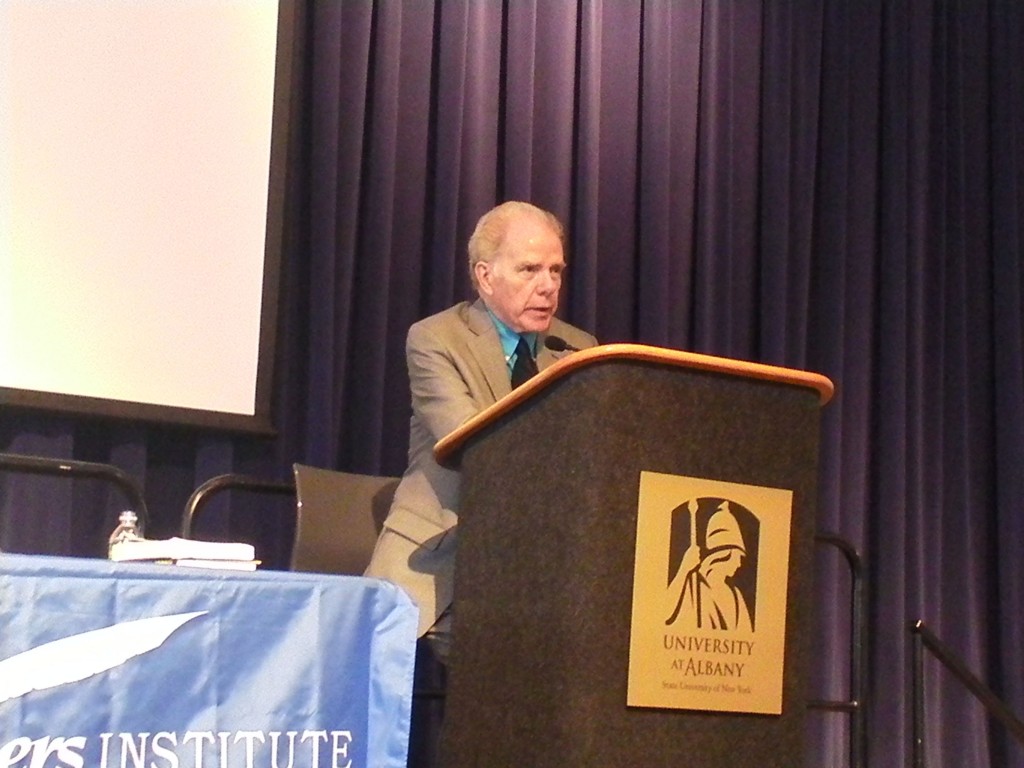
By TG BRANFALT JR.
Staff Writer
PUBLISHED OCTOBER 11, 2011
Albany’s own William Kennedy spoke at the University of Albany on Monday, October 4, on the back of his latest publication Chango’s Beads and Two-Tone Shoes. Part of the New York State Writers institute seminar series, Kennedy’s topics ranged from book themes to his family to his admiration for Ernest Hemingway.
“This is a master work,” said Don Faulkner, director of the New York State Writers Institute. “We are more than lucky to have him.”
Kennedy has authored ten titles, including Pulitzer Prize winning Ironweed and a non-fiction account of his hometown, titled O Albany. Kennedy also worked as a professor at UAlbany from 1974-1982 as well as a Times Union reporter.
Kennedy describes Chango’s Beads as picking up where Quinn’s Book left off, “I always thought that Quinn’s Book was an unfinished story,” Kennedy said. “I always thought Quinn would go to someplace exotic.” Quinn’s Book, like the majority of Kennedy’s tales, takes place in Albany.
Chango’s Beads, finds Daniel Quinn, the grandson of the Quinn’s Book progtagonist of the same name, in Cuba.
“The Cuba-Albany connection is very intense” Kennedy said. “During Prohibition, Cuban rum would come into our harbors,” he said.
Kennedy touched on three major societal themes in the work: sex, race and music. Set in 1968, Chango’s Beads represents a time before Castro and only three years following the repeal of Jim Crow laws in the United States. Bing Crosby’s “Shine” was a huge influence on Kennedy while writing, because it reminded him the “sad state of race relations” here in the U.S.
“Quinn’s book was [set in] 1910, Chango, 1968. Both years there were race riots,” Kennedy said. “Cuba was a place with a great deal of mixed race in the 60’s.”
The sexual attitudes of the countries were also in stark contrast, “Sex was a great allure of Cuban nightlife,” said Kennedy. “Cuba was a sexual tourist attraction, sex was a commodity,” he said.
Kennedy also compared Cuba to Puerto Rico, where in 1959 he established the San Juan Star. It was during that time Kennedy would form a relationship with Gonzo journalist Hunter Thompson. Kennedy was dubbed Lotterman in Thompson’s novel The Rum Diary. Richard Jenkins will also play the Lotterman character in the upcoming film adaptation.
“This is not one book, but two or three books” Kennedy said. “This book is nothing like my old novels.”
It is different because it is a return, a new chapter in an old story.
“I’ve certainly changed,” Kennedy mused. “My father lived his final five years with me, my mother had already passed, and we were very close. After my father passed I changed,” he somberly reminisced.
If the elder Quinn character is based on his father, Chango’s Quinn is based on Kennedy himself.
“It is a bit more autobiographical,” Kennedy said.

